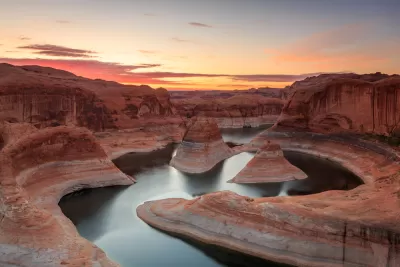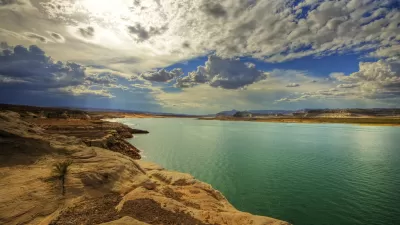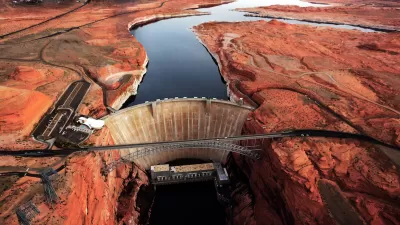Record low water levels are sinking Lake Powell's houseboat industry as climate change threatens water supplies in the West.

Historically low water levels in Lake Powell, the reservoir formed by the Glen Canyon Dam and one of the Southwest's biggest water sources and recreational destinations, is disrupting the recreational industry in the area and threatening water supplies, reports Annette McGivney in the Guardian. "The National Park Service abruptly announced earlier this month that houseboats could no longer use the Wahweap Launch Ramp, the busiest boat launch site in the area. Boats already cast out into the water were warned they had less than a week to return to land, or risk getting marooned."
The lake's water line recently "reached a historic low of 3,554ft, a level that has not been seen since 1969, when the reservoir was first filled. The giant reservoir is currently three-quarters empty and will keep dropping at least through next spring due to record low snowpack levels in the Colorado River basin." Of seven public boat launch ramps, just one remains reliably operational. "But that too may soon become inaccessible."
Meanwhile, "[a]s water managers and the Park Service scramble to adapt an infrastructure that was designed to function optimally when Lake Powell was full – which last happened in 1999 – some environmentalists are fighting to protect the nearly 100,000 acres of land that has emerged from beneath the high water mark." Eric Balken, executive director of the Glen Canyon Institute, says houseboating is just one of many recreational options people can access as the water line drops and Glen Canyon–vividly captured in Edward Abbey's seminal book Desert Solitaire–reemerges from the depths. "We are not anti houseboat, we are just pro-Glen Canyon," says Balken. "We want the ecological values of Glen Canyon to be part of the discussion about how to move forward during climate change."
FULL STORY: ‘Climate change has become real’: extreme weather sinks prime US tourism site

Alabama: Trump Terminates Settlements for Black Communities Harmed By Raw Sewage
Trump deemed the landmark civil rights agreement “illegal DEI and environmental justice policy.”

Planetizen Federal Action Tracker
A weekly monitor of how Trump’s orders and actions are impacting planners and planning in America.

Why Should We Subsidize Public Transportation?
Many public transit agencies face financial stress due to rising costs, declining fare revenue, and declining subsidies. Transit advocates must provide a strong business case for increasing public transit funding.

Understanding Road Diets
An explainer from Momentum highlights the advantages of reducing vehicle lanes in favor of more bike, transit, and pedestrian infrastructure.

New California Law Regulates Warehouse Pollution
A new law tightens building and emissions regulations for large distribution warehouses to mitigate air pollution and traffic in surrounding communities.

Phoenix Announces Opening Date for Light Rail Extension
The South Central extension will connect South Phoenix to downtown and other major hubs starting on June 7.
Urban Design for Planners 1: Software Tools
This six-course series explores essential urban design concepts using open source software and equips planners with the tools they need to participate fully in the urban design process.
Planning for Universal Design
Learn the tools for implementing Universal Design in planning regulations.
Caltrans
Smith Gee Studio
Institute for Housing and Urban Development Studies (IHS)
City of Grandview
Harvard GSD Executive Education
Toledo-Lucas County Plan Commissions
Salt Lake City
NYU Wagner Graduate School of Public Service





























